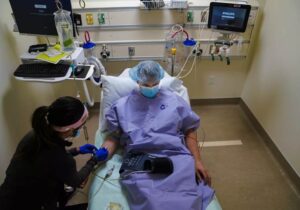After her diagnosis of breast cancer, a friend called Sinead to tell her what to expect when dealing with cancer. “You will actually lose some of your friends,” said the caller. Confused, Sinead asked, “Why would I lose some of my friends?” Her friend said, “For different reasons, but you will, and don’t take it personally.” Sinead then told me, “And I did. I lost two good friends who, from the day I was diagnosed, have never contacted me.”
At a Loss and Don’t Know What to Do
Losing friendships is common during a challenging illness. In fact, such loss was a recurring theme in my interviews with people facing a serious health challenge.
Why does this happen? As the caller suggested, there may be many reasons. Included among these might be guilt, fear, or maybe even something as simple as just not knowing what to do. If you are the friend wondering how to help, or worrying about doing the right thing, here are some ideas for what to do when friends get sick. Although the ideas may seem simple, these acts can make a world of difference to a friend in need.
What to Do When Friends Get Sick
Check-in. Stay in touch.
Don’t be offended if you don’t hear back. Illness changes the playbook. Someone diagnosed with a serious illness is dealing with a whirlwind of information, questions, and uncertainty. When a friend gets sick, navigating a path through a serious illness is stressful, as well as physically and emotionally exhausting. Your friend needs to know you care although she may not always have the time nor the physical or mental energy to respond. Don’t feel discouraged if you don’t hear back but continue to check in on occasion either with a card, e-mail, or even leaving a phone message. Letting your friend know you are thinking of her, and offering to help in some specific way, sends a positive message during a difficult time.
Send a card. Send flowers. Bring soup.
Such gestures are concrete ways of saying, ‘I care’ and ‘I am thinking of you,’ when a friend gets sick. These simple acts of kindness are deeply meaningful to a friend whose world has been turned upside down. Trained as a registered nurse, Nora worked as a case manager for 15 years helping patients access the care they needed. Comfortable with taking care of others, the tables turned dramatically one morning when Nora suffered a stroke during a visit to her in-laws in a small Vermont town.
Nora expressed surprise to learn that simple gestures could mean so much. “People have brought me … soups and … had lunch with me, gone for walks with me, things like that, it’s been really good.” Having experienced such kindnesses, Nora knows how important it is to do the same for others. “I had so many flowers and it just, that’s very uplifting … I just love flowers and so it’s made me think about if I have an associate, it doesn’t matter if they’re a good friend or just…someone I work with … a card … means so much, it really does.”
Offer to accompany the patient to doctor’s appointments and take notes.
Be an advocate. When patients reflect back on their experiences, having someone with them for doctor’s appointments to listen, to help with questions, and to take notes, is of significant value. Diagnosed with myelodysplastic syndrome and myeloprolific neoplasms, a blood cancer often referred to as pre-leukemia, Bill spent a lot of time in doctor’s offices both before and after the diagnosis. To help navigate these physician visits, Bill was fortunate to have his sister, who also happens to be a nurse. “My sister went to every doctor’s appointment with me. She read all the literature about my disease.”
Don’t worry about having a medical background; simply having someone else in the room to listen, to take notes, and to help with questions is so important. Although Sinead did not have this type of support during her own treatment, she recognized the importance of the role and willingly took on this responsibility for another friend diagnosed with cancer. “I took notes for her the whole time and helped her with different things and questions and where to go and how to find out information, all the rest of it.”
Find ways to meet daily necessities.
A friend of mine was diagnosed with breast cancer just this past year. We talked recently about the difficulty patients often have asking for, and accepting help, even when it may be needed. With one child at home, and a husband working full-time, meals from friends and family were vital to Sarah and her family when she was recuperating from surgeries. Sarah noted that asking for help was much easier when she could reach out to one person, rather than several.
There are a number of websites to help friends and neighbors coordinate meals for someone in need. You can help by setting up the site and letting others know it is available. Here are a few:
- Take Them A Meal – www.takethemameal.com
- Meal Train – www.mealtrain.com
- Share the Care – www.sharethecare.org
- Care Calendar – www.carecalendar.org
Share the Care and Care Calendar can extend to include other activities such as running errands, shopping, walking the dog, yard or housework.
Listen. Really Listen.
Now is not the time to tell your story. Sinead recalls meeting up with a group of friends shortly after her diagnosis, and saying, “I need to tell you something… I’ve just been diagnosed with breast cancer. And I barely had it out of my mouth, and somebody said, ‘Oh, my gosh, a friend of mine just went through that and blah, blah, blah’ and the rest of us just sat there and listened to her story. .. and then eventually I got to talk again. And that didn’t just happen once.”
When battling cancer, or any other serious illness, there is a lot of information to process, decisions to make, and new emotional territory to navigate. Your friend really just needs someone who will listen. Listening without judgement, opinion, or interruption is an art that takes practice but is critically important when friends get sick. Remember to keep the focus on the patient.
Recovery is a Process.
Recovery does not mean the patient journey is over. Even when a patient’s surgery is successful, or the cancer is in remission, or she has been declared cancer-free, there is more. Residual physical and emotional challenges are common. Jaime speaks poignantly of her experience with life after a serious illness.
Jaime endured nearly a year of invasive treatments and procedures, including a hysterectomy, based on misdiagnoses. By the time of Jaime’s diagnosis with colon cancer, the cancer was Stage IV with metastases to the liver. Surgery appears to have been surprisingly effective and Jaime is in recovery mode. However, when we spoke, Jaime confided,
It’s really difficult because I feel like I can’t plan anything, like, going on vacations or … just really life in general. And that sets off the depression, and that I think is the most difficult thing to, to work with, is the depression and the anxiety of the ‘what if?’, just waiting for the other shoe to drop. And ‘oh, no, we didn’t get all the cancer, there’s a recurrence’… that’s how it’s affected the rest of my life, I think, more than anything else is just fear. “And, so I’m trying to cope with that… a lot of times, people will say okay, well, you’re cancer-free now, so … everything goes back to normal. Not so much. [LAUGHS] It’s almost, I would almost rather go through treatment and knowing … what I’m dealing with then, ‘you’re disease free’ and having that fear in the back of my head.
Jaime
As a friend, recognize the validity of the recovery process and continue to reach out, show kindness, and listen, really listen.
Step Up and Take Action
A friend’s serious illness is the time to step up and show the meaning of friendship. There are many different ways to help when friends get sick – some grand and others fairly simple – each can have a positive impact and can be meaningful. Take the time to ask, listen, and act – don’t be the friend that disappears.
Learn more from patients’ experiences. Explore the value of advocacy and support when getting a medical diagnosis as well as learning how to ask for, and accept support during a serious illness.
*Quotes in this post are from interviews conducted for my book, Navigating Illness: The Patient Experience, a work in progress. Names were changed upon an individual’s request.



